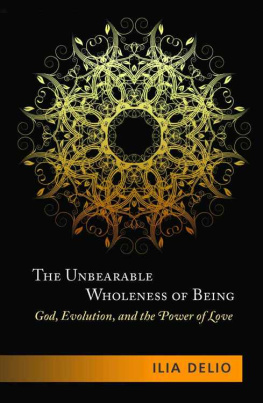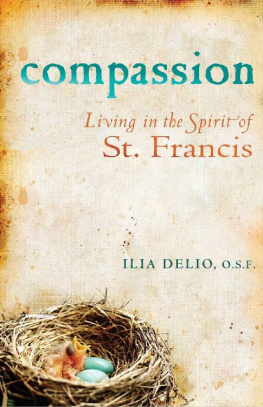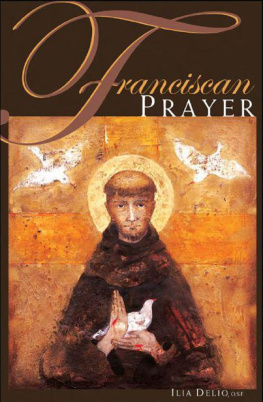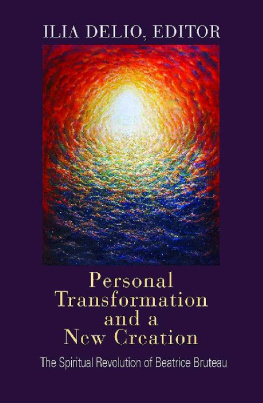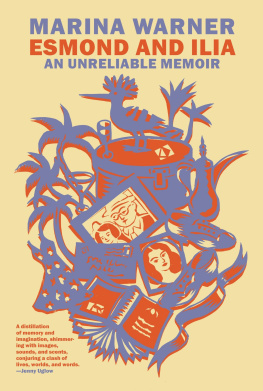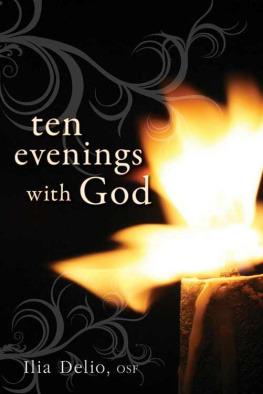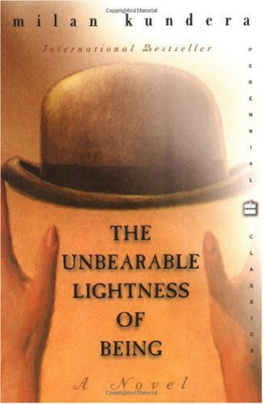Ilia Delio - The Unbearable Wholeness of Being: God, Evolution, and the Power of Love
Here you can read online Ilia Delio - The Unbearable Wholeness of Being: God, Evolution, and the Power of Love full text of the book (entire story) in english for free. Download pdf and epub, get meaning, cover and reviews about this ebook. year: 2013, publisher: Orbis Books, genre: Religion. Description of the work, (preface) as well as reviews are available. Best literature library LitArk.com created for fans of good reading and offers a wide selection of genres:
Romance novel
Science fiction
Adventure
Detective
Science
History
Home and family
Prose
Art
Politics
Computer
Non-fiction
Religion
Business
Children
Humor
Choose a favorite category and find really read worthwhile books. Enjoy immersion in the world of imagination, feel the emotions of the characters or learn something new for yourself, make an fascinating discovery.
- Book:The Unbearable Wholeness of Being: God, Evolution, and the Power of Love
- Author:
- Publisher:Orbis Books
- Genre:
- Year:2013
- Rating:3 / 5
- Favourites:Add to favourites
- Your mark:
- 60
- 1
- 2
- 3
- 4
- 5
The Unbearable Wholeness of Being: God, Evolution, and the Power of Love: summary, description and annotation
We offer to read an annotation, description, summary or preface (depends on what the author of the book "The Unbearable Wholeness of Being: God, Evolution, and the Power of Love" wrote himself). If you haven't found the necessary information about the book — write in the comments, we will try to find it.
The Unbearable Wholeness of Being: God, Evolution, and the Power of Love — read online for free the complete book (whole text) full work
Below is the text of the book, divided by pages. System saving the place of the last page read, allows you to conveniently read the book "The Unbearable Wholeness of Being: God, Evolution, and the Power of Love" online for free, without having to search again every time where you left off. Put a bookmark, and you can go to the page where you finished reading at any time.
Font size:
Interval:
Bookmark:

The Unbearable
Wholeness of Being
The Unbearable
Wholeness of Being
God, Evolution, and the Power of Love
Ilia Delio, OSF

Founded in 1970, Orbis Books endeavors to publish works that enlighten the mind, nourish the spirit, and challenge the conscience. The publishing arm of the Maryknoll Fathers and Brothers, Orbis seeks to explore the global dimensions of the Christian faith and mission, to invite dialogue with diverse cultures and religious traditions, and to serve the cause of reconciliation and peace. The books published reflect the views of their authors and do not represent the official position of the Maryknoll Society. To learn more about Maryknoll and Orbis Books, please visit our website at www.maryknollsociety.org.
Copyright 2013 by Ilia Delio.
Published by Orbis Books, Maryknoll, New York 105450302.
Manufactured in the United States of America.
Manuscript editing and typesetting by Joan Weber Laflamme.
All rights reserved.
No part of this publication may be reproduced or transmitted in any form or by any means, electronic or mechanical, including photocopying, recording or any information storage or retrieval system, without prior permission in writing from the publisher.
Queries regarding rights and permissions should be addressed to:
Orbis Books, P.O. Box 302, Maryknoll, New York 105450302.
Library of Congress Cataloging-in-Publication Data
Delio, Ilia.
The unbearable wholeness of being : God, evolution and the power of love / Ilia Delio.
p. cm.
Includes bibliographical references and index.
ISBN 9781626980297 (pbk.)
1. God (Christianity)Omnipresence. 2. EvolutionReligious aspectsCatholic Church. 3. ChristianityPhilosophy. 4. SpiritualityCatholic Church. 5. LoveReligious aspectsChristianity. I. Title.
BT132.D45 2013
231dc23
2012042399
It is the attraction of the whole that has set everything in motion in me, has animated and given organic form to everything. It is because I feel the whole and love it passionately that I believe in the primacy of being... nothing in the world is intelligible except in and starting from the whole.
Teilhard de Chardin
Science and Christ
At the center of our being is a point of nothingness that is untouched by sin and by illusion, a point of pure truth, a point or spark which belongs entirely to God, which is never at our disposal, from which God disposes our lives, which is inaccessible to the fantasies of our mind or the brutalities of our own will.... It is like a pure diamond, blazing with the invisible light of heaven. It is in everybody, and if we could see it we would see these billions of points of light coming together in the face and blaze of a sun that would make all the darkness and cruelty of life vanish completely.
Thomas Merton
Conjectures of a Guilty Bystander
Contents
Love, Learning,
and the Desire for Power
Acknowledgments
I would like to thank Orbis Books for supporting my work and, in particular, my dear friend and advocate, Mike Leach. I am especially grateful to Sr. Madeline Duckett, RSM, who traveled from Australia to join me for eight weeks of discussion on Christianity, evolution, and emerging wholeness. Madeline read the book chapter by chapter, offering suggestions and insightful ways of engaging the material. Thanks too to Sr. Dorothy McCormack, OSF, who read several chapters and offered editorial changes. I am grateful for the patience and understanding of my community, the Franciscan Sisters of Washington, DC, as well as its support. A sincere thank you goes to my colleagues at Woodstock Theological Center, Georgetown University, for their support and encouragement as well. I have benefited from our Ignatian-Lonergan Seminars and continue to find our conversations deeply enriching. I would like to dedicate this book to my colleague Fr. John Haughey, SJ, who opened up for me a new lens on the virtue of catholicity. John never ceases to amaze me on how to live into our questions.
Introduction
In her keynote presentation at the 2009 annual conference of the Catholic Theological Society of America, Carmelite scholar Connie Fitzgerald spoke eloquently on the theme of impasse, dark night, and the purification of memory, a theme she has explored over the last several decades through the mystical writings of John of the Cross. Impasse is the space between what was and what can be, frozen or impassible by factors of fear, distrust, anger, darkness, and the many layers of memory. It is the space in which we find ourselves today, as Fitzgerald writes:
Although my exploration raises its own disturbing questions, I hope it will offer a significant contribution to theological reflection at a time when polarization, suspicion, denouncement, investigation, silencing, alienation, anger, cynicism and sadness divide our Church, and when our country is rocked by economic meltdown precipitated by years of wrongdoing and greed, our earth menaced with extinction, the religions of the world plagued with extremism and age-old distrust that fuel war and terrorism, the people of the world abused with violence, slavery and deprivation too great to measure. We are encumbered by old assumptions, burdened by memories that limit our horizons and, therefore, unfree to see God coming to us from the future.
Fitzgerald provides a profound analysis of the purification of memory, whereby in silent prayer, the prayer of no experience, a new dispossessed self can emerge that realizes more fully our relational evolution and synergistic existence in the universe.
Although her study is a complex interaction of culture, psychology, and spirituality, I think the impasse Fitzgerald skillfully articulates has been developing since the Late Middle Ages, when astronomers discovered that the earth orbits around the sun, marking the birth of modern science and philosophy. It was then that modernitys impasse was born. The human person became decentered from a stable universe, insignificant in the face of modern science, while God became remote and distant. The image of a blissful Garden of Eden recounted in scripture became less a constructive image of divine-human relatedness than a fallacy of misplaced concreteness. Science and technology gained prominence as guides for the human quest.
The impasse in which we find ourselves in today, the inability of ecclesial and cultural systems to cooperate for the welfare of humankind, bears the lack of a fundamental meta-narrative. We have no overarching story that unites us and instills hope and courage. The rise of postmodernity signaled an end to meta-narratives. The postmodern age of religious and cultural pluralism invited a multiplicity of narratives as the operative norm of human community. At the center of the postmodern milieu, marked by ambivalence and relevance, is the individual whose autonomy cannot be disturbed. You are you and I am I and if each of us follows our own story, the world machine will keep on humming. But we have been inattentive to the cosmology that holds our lives together. How do our individual and communal stories shape our lives in the larger order of things? What holds us together despite our differences? We need a larger story that can include diversity and difference, and in which our local stories can thrive.
Stories create meaningful lives; they provide cohesiveness and direction. For centuries Christianity told a grand narrative of God, creation, and humanity that held such power and conviction that virtually all systems were based on it. We believed everything in the Bible to be historically true. Now, modern biblical scholarship discloses that stories of the Old and New Testaments were prayerfully created for the purpose of community, rather than as historical narratives. Yet, the stories of the Bible are deeply embedded in our religious consciousness and have provided images and symbols to define our relationship with God. In the Middle Ages theologians such as Thomas Aquinas and Bonaventure elaborated a system of Christian thought based on the Bible, the church fathers, medieval cosmology, and philosophy. Core Christian doctrine was formed against the backdrop of the concentric, static, and hierarchical Ptolemaic universe. To this day all our core doctrines are fitted to this universe even though, as early as the sixteenth century, modern science began to describe a new universe that departed from the static, Ptolemaic one. The inability to engage a new religious story, however, has confined us to the old one. The impasse we find ourselves in is centuries old, and until we can purify our memory, as Fitzgerald suggests, we are heading down a dangerous path.
Next pageFont size:
Interval:
Bookmark:
Similar books «The Unbearable Wholeness of Being: God, Evolution, and the Power of Love»
Look at similar books to The Unbearable Wholeness of Being: God, Evolution, and the Power of Love. We have selected literature similar in name and meaning in the hope of providing readers with more options to find new, interesting, not yet read works.
Discussion, reviews of the book The Unbearable Wholeness of Being: God, Evolution, and the Power of Love and just readers' own opinions. Leave your comments, write what you think about the work, its meaning or the main characters. Specify what exactly you liked and what you didn't like, and why you think so.

